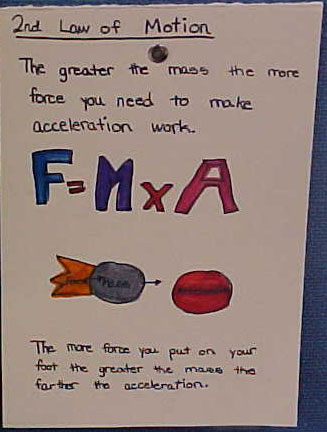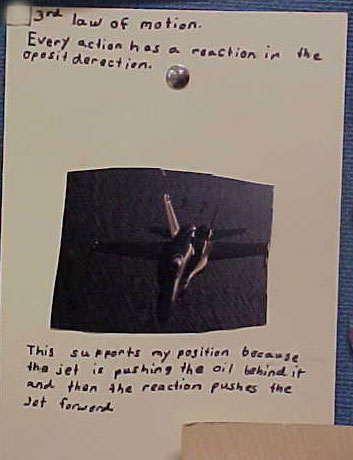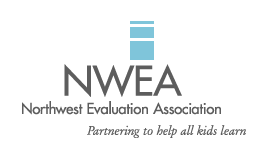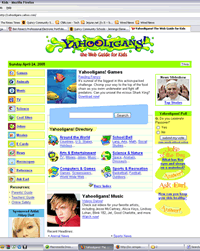 |
 |
 |
|
Assessment
comes in many forms, from formal standardized testing
to assess the level of standards achievement
to simple informal assessments that are used to
assess the day to day progress of students.
To put the students at ease, and to let them
use their own words, many of my informal assessments
are in the form of short written or creative responses.
In these two examples of informal assessment the
students have (1) used prior knowledge and experience
to complete a list of compound machines in the classroom
and (2) create an "Illustrated Definition"
of one of the Law's of Motion which I used to create
a bulletin board and later bind together into a
"Law of Motion Dictionary."
|
 |
(1) |
 |
(2) |
 |
 |
 |
| (click
on a page to see an enlarged image) |
(click
on a picture to see an enlarged image) |
|
 |
An educator's "toolbox" of assessments would not be complete without an understanding of formal assessment pieces. Standardized norm-referenced tests and systematic skill-based tests are both assessments that an educator will have to utilize throughout their career. While teaching, I have become familiar with several standardized tests including the Michigan Educational Assessment Program, the Iowa Test of Basic Skills, and the Northwest Evaluation Association's electronic based Measure of Academic Progress (MAP) assessment.
|
 (Click on the image above to visit NWEA's website)
(Click on the image above to visit NWEA's website) |
As a technology teacher in a computer lab setting, I have become familiar with administering the MAP to students as well as it's unique format. Providing different assessments in the core content areas, the MAP's questions are anchored to individual state benchmarks from all levels of the K-12 curriculum. Because of this, the MAP allows for two methods of comparison when evaluating students; the student's performance as compared with their grade level peers, and comparison of student growth over time through Fall and Spring assessments. Both of these important pieces of data are gathered by the MAP's Test Taker program and can be used throughout the year to check a student's progress. |
|
 |
|
Science
Assessment
would not be whole without a practical use of concepts
and information the students have been incorporating
into their own understanding. For this reason, a
performance assessment in Science is required at
regular intervals to determine if students can
apply what they've learned about the scientific method to solving a problem.
Using both experiments and materials provided by
the text, my mentor teacher and I created guiding
questions and a "Science Investigation."
This format allowed the students to not only practice
using the scientific method, but provided them with a rigid
format for organizing their thoughts.
|
|
|
| (click
on either page to see an enlarged image) |
Using the Internet
While working closely with a second grade teacher at Jennings Elementary, I was able to incorporate a lesson on using Internet Search Engines with their studies. The teacher (who was also my Pathwise Mentor) anticipated having her students complete a short informational booklet on a U.S. state, and was eager to have me show her students how to use search engines effectively as well as explain the general concept of how search engines function. Before attempting the state project I wrote a short Search Engine lesson and then had the students utilize the concepts learned to collect information on famous Americans, which they later used in their own classroom. The lesson was quite effective, as indicated by the performance piece of locating information on the famous Americans. The majority of students were using Search Engines wisely, including utilizing reference sections and organized topic areas with ease, to locate information on their subjects. Click on the image below to view a PDF version of the Search Engine lesson.

(click on the image to open the lesson in a new window)
|
Return
to Top
|
|
|
 |
|